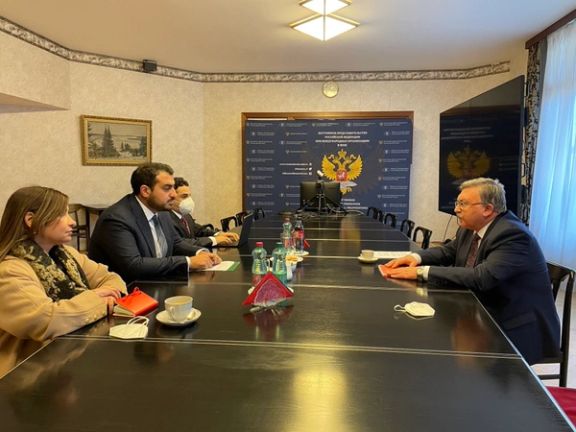Iran Tries To Ignore The Saudi Foray Into Vienna Talks

While a Saudi Arabian diplomat last week met with nuclear negotiators from world powers in Vienna, Iran is trying to dispel any perception of being circumvented.

While a Saudi Arabian diplomat last week met with nuclear negotiators from world powers in Vienna, Iran is trying to dispel any perception of being circumvented.
The government spokesman said Tuesday Tehran is not involved and would not comment on the recent meetings of Saudi and South Korean representatives with other parties to the Vienna talks.
At his press briefing Tuesday, Ali Bahadori-Jahromi said the presence of “some countries” in Vienna and their meetings with the other participants in the talks is "their independent decision and based on their mutual relations". "Such consultations is their business and will not affect the atmosphere of the talks," he insisted.
"Naturally, the Iranian delegation is not involved in such meetings and has not, and will not, comment on them," Bahadori-Jahromi told reporters.
The Saudi envoy to international organizations in Vienna, Abdullah bin Khalid, has reportedly met separatelywith Russian, Chinese and French delegations as well as the US Special representative for Iran Robert Malley to discuss the latest developments in the talks for restoring the 2015 nuclear deal, the Joint Comprehensive Plan of Action (JCPOA).
Russia's envoy to the talks, Mikhail Ulyanov, in a tweet after his meeting with the Saudi envoy said the two sides had exchanged views on prospects of a security dialogue in the Persian Gulf region.
The news of Saudi diplomatic contacts with JCPOA negotiators has raised some controversies in Iran. Some pundits argue that the involvement of Riyadh is very different from Seoul's involvement due to the longstanding issue of billions of dollars in Iranian money frozen in South Korea due to US sanctions. Unfreezing these assets is related to the Vienna talks.
Speaking to Iran Diplomacy website, former chairman of the Iranian parliament's national security and foreign policy committee, Heshmatollah Falahatpisheh, said whereas Korea's involvement should be taken positively, the Saudi involvement was negative.
"The Saudi involvement in Vienna talks, through any member of the 4+1 [current JCPOA members including France, Britain, Russia, China, and Germany] or the United States, should be seen in the context of a balancing act against Tehran in the talks," Falahatpisheh, a former conservative lawmaker, said.
Falahatpished added that in his view the French, Americans and even Russians will all benefit from Saudi involvement in the talks which he insisted should have involved only three players – Iran, the US, and the United Nations' Security Council as an international organization. He also criticized Russia's role in the talks and said they were as much responsible for involving the Saudis in the Vienna talks as the European sides, particularly France.
The former high-profile lawmaker also argued that Iran had always insisted it would not consent to anything other than the nuclear issue to be included in the negotiations, but the Saudi involvement has in effect broken Iran's redlines. "Saudi involvement in Vienna means attempts to examine the regional concerns they claim to have due to Iran's missile and defensive power as well as its regional influence," he said.
Arab countries in the region, particularly Saudi Arabia, have long demanded to be engaged in the nuclear talks with Iran which they say is directly related to their security due to very close geographical proximity.
Last week, Saudi Arabia’s foreign minister Prince Faisal bin Farhan reiterated Riyadh’s concernsabout Iran’s “destabilizing role” and “transgressions” in its nuclear program.
Riyadh and Tehran held talks last year to reduce tensions with the aim of restoring diplomatic ties broken since January 2016.
Speaking to Al Jazeera, Foreign Minister Hossein Amir-Abdollahian described the ongoing dialogue with Saudi Arabia as "positive and constructive" and said Tehran was ready to restore relations with Riyadh "at any time".